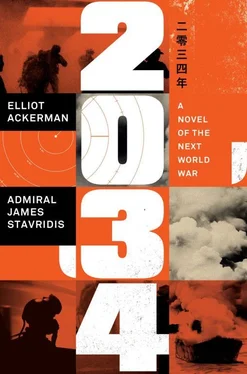The brigadier asked him once again why he was there.
Wedge did what he’d been trained to do, what the Code of Conduct demanded: he answered the brigadier’s question by giving only his name, rank, and service number.
“That’s not what I asked you,” said the brigadier. “I asked why you are here.”
Wedge repeated himself.
The brigadier nodded, as if he understood. He circled the room until he stood behind Wedge. The brigadier rested both his hands on Wedge’s shoulders, allowing the three fingers of his mangled right hand to crawl crab-like toward the base of Wedge’s neck. “The only way we can resolve this situation is to work together, Major Mitchell. Whether you like it or not, you’ve trespassed. We have the right to know why you are here so we can resolve this. Nobody wants things to escalate further.”
Wedge glanced toward the camera in the center of the ceiling. He repeated himself for a third time.
“Would it help if I turned that off?” the brigadier asked, looking up at the camera. “You could tell just me. Everything doesn’t have to be recorded.”
Wedge knew from his survival training that the brigadier was trying to ingratiate himself and build trust, and then through that trust to elicit a confession. The goal of an interrogation wasn’t information but rather control—emotional control. Once that control was taken—preferably by building rapport, but just as often through intimidation, or even violence—the information would flow. But something didn’t add up with this brigadier: his rank (he was too senior to be a first-line interrogator), his scars (he had too many of them to have spent a career in intelligence), and his uniform (Wedge knew enough to recognize that he wasn’t standard Iranian military). What Wedge felt was nothing more than his intuition, but he was a pilot, reared from a long line of pilots, all of whom had been taught to trust their well-cultivated intuition, both in and out of the cockpit. And it was his trust in this intuition that led him to go on the offense, to make a desperate attempt to gain control of the situation.
The brigadier asked Wedge one more time why he’d come.
This time Wedge didn’t answer with his name, rank, and service number. Instead, he said, “I’ll tell you, if you tell me.”
The brigadier appeared surprised, as if his reason for being there was obvious. “I’m not sure that I understand.”
“Why are you here?” asked Wedge. “If you tell me, then I’ll tell you.”
The brigadier was no longer standing behind Wedge but had returned to his seat across from him. He leaned curiously toward his prisoner. “I’m here to question you,” the brigadier said tentatively, as if this fact embarrassed him in some way he didn’t recognize until the very words had escaped his mouth.
“Bullshit,” said Wedge.
The brigadier came out of his seat.
“You’re no interrogator,” continued Wedge. “With a face like that you want me to believe you’re some intel weenie?”
And that entire face, aside from the scar tissue, began to turn shamefully red.
“You should be out in the field, with your troops,” said Wedge, and he was smiling now, with a reckless grin. He’d taken a gamble and from the brigadier’s reaction he knew he’d been right. He knew he had control. “So why are you in here? Who’d you piss off to get stuck with this shit duty?”
The brigadier was towering over him. He swung back and struck Wedge so hard that he knocked his chair out of the floor where it had been bolted. Wedge toppled over. He hit the ground lifeless as a mannequin. As he lay on his side with his wrists still bound to the chair, the blows fell on him in quick succession. The video camera with its solid red light, high up in the center of the ceiling, was the last thing Wedge saw before he blacked out.

11:01 March 13, 2034 (GMT+8)
South China Sea
They charged out of the east, two silvery flashes on the horizon, and made an orbit around the badly wounded John Paul Jones . Nearly half the crew, more than one hundred sailors, had perished since that morning, either incinerated in the blast from the pair of successive torpedo impacts or entombed in the flooded compartments belowdecks that their shipmates had been forced to secure with them still trapped inside. There were very few wounded, mostly dead, as was usually the case in naval engagements, where there was no battlefield for the injured to rest upon, only the consuming sea.
When the two planes didn’t come in straight for the attack, a collective silence fell over the crew, like a breath sucked in. Within that breath was a fleeting hope that these planes had been sent from Yokosuka, or perhaps launched from a friendly carrier dispatched to their aid. But as soon as the crew of the John Paul Jones glimpsed their wings, which were laden with munitions, and observed that the two aircraft kept a cautious distance, they knew they weren’t friendly.
But why didn’t they strike? Why didn’t they drop their ordnance and finish the job?
Captain Sarah Hunt couldn’t waste her time on speculation. Her full attention remained where it had since the first torpedo hit the day before. She needed to keep her flagship afloat. And it was, sadly, her ship now. Commander Morris hadn’t been seen since the second impact. Hunt hadn’t heard from the Levin or Chung-Hoon either. She’d only watched, helplessly, as each was crippled and then sunk. This was the fate that would soon befall her and the surviving members of her crew. Although they’d contained most of the fires on the John Paul Jones , they were taking on more water than they could pump out. As the weight of the water contorted the steel hull, it creaked mournfully, like a wounded beast, as minute by minute it came closer to buckling.
Hunt stood on the bridge. She tried to occupy herself—checking and rechecking their inoperable radios, dispatching runners for updates from damage control, replotting their position on an analog chart since anything that required a GPS had failed. She did this so her crew wouldn’t despair at their captain’s inactivity, and so that she herself wouldn’t have to imagine the water slipping over the mast. She glanced up, at the twin attack planes from the Zheng He . How she wished they would stop taunting her, that they would stop their impudent circling, drop their ordnance, and allow her to go down with her ship.
“Ma’am…” interjected one of the radiomen standing beside her, as he pointed toward the horizon.
She glanced up.
The flight of two had changed their angle of attack. They were darting toward the John Paul Jones , flying low and fast, staggered in echelon. When the sun glinted off their wings, Hunt imagined it was their cannons firing. She grimaced but no impacts came. The flight of two was closing the distance between them. The weapon systems on the John Paul Jones had been taken out of action. On the bridge there was silence. Her command—the hierarchy that was her ship and its crew—it all melted away in these, their final moments. The radioman, who couldn’t have been more than nineteen, glanced up at her, and she, surprising herself, placed her arm around him. The flight of two was so close now, so low, that she could observe the slight undulation of their wings as they passed through the uneven air. In a blink their ordnance would drop.
Hunt shut her eyes.
A noise like thunder—a boom.
But nothing happened.
Hunt glanced upward. The two planes turned aerobatic corkscrews around each other, climbing higher and higher still, losing and finding themselves in striations of cloud. Then they descended again, passing a hundred feet or less above the surface of the ocean, flying slowly, right above stall speed. As they passed in front of the bridge, the lead plane was so close that Hunt could see the silhouette of the pilot. Then he dipped his wing—a salute, which Hunt believed was the message he’d been sent there to deliver.
Читать дальше













